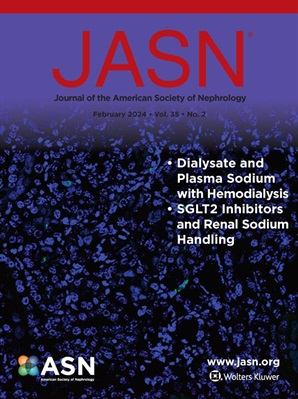Antineutrophil Cytoplasmic Autoantibodies: Role in Diagnosis, Disease Monitoring, and Prognosis.
IF 10.3
1区 医学
Q1 UROLOGY & NEPHROLOGY
引用次数: 0
Abstract
Antineutrophil cytoplasmic autoantibody (ANCA)-associated vasculitis is a rare and potentially fatal autoimmune disorder characterized by pauci-immune necrotizing vasculitis affecting small to medium sized blood vessels. The pathogenic role of ANCAs in ANCA-associated vasculitis is supported by both clinical and experimental evidence, and when used in the proper clinical setting ANCA testing is highly specific for ANCA-associated vasculitis. Testing with both indirect immunofluorescence assay (IFA) and enzyme immunoassay (EIA) may increase sensitivity for ANCA-associated vasculitis, however testing with a high-quality EIA may be used alone. Non-vasculitic conditions and drugs can cause ANCA positivity without manifestations of ANCA-associated vasculitis. We review ANCA testing itself, performance characteristics and specific conditions for the laboratory test, and various conditions when ANCA testing is useful in diagnosis, disease monitoring and selecting treatment.抗中性粒细胞胞浆自身抗体:在诊断、疾病监测和预后中的作用。
抗中性粒细胞胞浆自身抗体(ANCA)相关血管炎是一种罕见且潜在致命的自身免疫性疾病,其特征是影响中小血管的少免疫坏死性血管炎。临床和实验证据都支持ANCA在ANCA相关血管炎中的致病作用,当在适当的临床环境中使用ANCA检测时,ANCA检测对ANCA相关血管炎具有高度特异性。间接免疫荧光测定法(IFA)和酶免疫测定法(EIA)均可增加对anca相关血管炎的敏感性,但高质量的EIA检测可单独使用。非血管疾病和药物可引起ANCA阳性,但没有ANCA相关血管炎的表现。本文综述了ANCA检测本身、性能特点和实验室检测的具体条件,以及ANCA检测在诊断、疾病监测和选择治疗方面的各种情况。
本文章由计算机程序翻译,如有差异,请以英文原文为准。
求助全文
约1分钟内获得全文
求助全文
来源期刊
CiteScore
22.40
自引率
2.90%
发文量
492
审稿时长
3-8 weeks
期刊介绍:
The Journal of the American Society of Nephrology (JASN) stands as the preeminent kidney journal globally, offering an exceptional synthesis of cutting-edge basic research, clinical epidemiology, meta-analysis, and relevant editorial content. Representing a comprehensive resource, JASN encompasses clinical research, editorials distilling key findings, perspectives, and timely reviews.
Editorials are skillfully crafted to elucidate the essential insights of the parent article, while JASN actively encourages the submission of Letters to the Editor discussing recently published articles. The reviews featured in JASN are consistently erudite and comprehensive, providing thorough coverage of respective fields. Since its inception in July 1990, JASN has been a monthly publication.
JASN publishes original research reports and editorial content across a spectrum of basic and clinical science relevant to the broad discipline of nephrology. Topics covered include renal cell biology, developmental biology of the kidney, genetics of kidney disease, cell and transport physiology, hemodynamics and vascular regulation, mechanisms of blood pressure regulation, renal immunology, kidney pathology, pathophysiology of kidney diseases, nephrolithiasis, clinical nephrology (including dialysis and transplantation), and hypertension. Furthermore, articles addressing healthcare policy and care delivery issues relevant to nephrology are warmly welcomed.

 求助内容:
求助内容: 应助结果提醒方式:
应助结果提醒方式:


